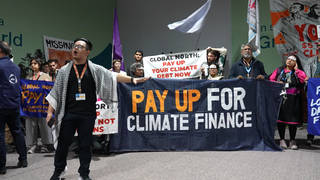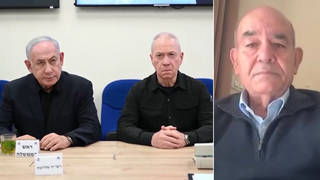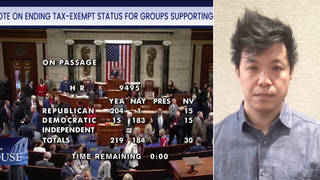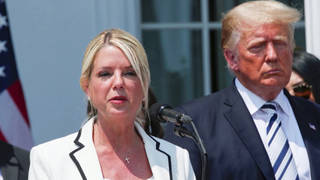HeadlinesApril 12, 2019
Julian Assange’s Lawyers Vow to Fight His Extradition to the United States
Attorneys for WikiLeaks founder Julian Assange are vowing to fight his possible extradition to the United States following his arrest in London. On Thursday, British police forcibly removed Assange from the Ecuadorean Embassy, where he had taken asylum for almost seven years. Soon after his arrest, U.S. authorities unsealed an indictment accusing him of conspiring with Army whistleblower Chelsea Manning, who leaked a trove of sensitive documents to WikiLeaks—including evidence of U.S. war crimes in Iraq and Afghanistan. CNN is reporting the Justice Department is expected to bring additional charges against Assange. In London, Assange’s attorney Jennifer Robinson warned the prosecution of Assange could jeopardize press freedom.
Jennifer Robinson: “This sets a dangerous precedent for all media organizations and journalists in Europe and elsewhere around the world. This precedent means that any journalist can be extradited for prosecution in the United States for having published truthful information about the United States. I’ve just been with Mr. Assange in the police cells. He wants to thank all of his supporters for their ongoing support. And he said, 'I told you so.'”
Another member of Assange’s legal team, the Spanish lawyer Baltasar Garzón, said he fears Assange may be tortured if extradited to the United States. He spoke to reporters in Madrid.
Baltasar Garzón: “Chelsea Manning was subjected to torture, as special rapporteur on torture Juan Méndez revealed at the time. So, we think it is the same case, and we have serious and founded reasons for thinking this could happen.”
Ecuadorean Ex-President Criticizes Successor for Allowing Assange to Be Arrested
Julian Assange was arrested shortly after the Ecuadorean government withdrew his asylum. Former Ecuadorean President Rafael Correa criticized Ecuador’s current president, Lenín Moreno, for what happened. Correa wrote, “The greatest traitor in Ecuadorian and Latin American history, Lenin Moreno, allowed the British police to enter our embassy in London to arrest Assange. Moreno is a corrupt man, but what he has done is a crime that humanity will never forget.”
Trump Claims “I Know Nothing About WikiLeaks” Despite Praising Site Repeatedly in 2016
At the White House, President Trump was asked about WikiLeaks on Thursday.
Reporter: “Mr. President, do you still love WikiLeaks?”
President Donald Trump: “I know nothing about WikiLeaks. It’s not my thing.”
While Trump claimed he knew nothing about WikiLeaks, he repeatedly praised the whistleblowing site during the 2016 campaign for publishing internal Democratic Party emails.
Donald Trump: “This just came out. This just came out. WikiLeaks! I love WikiLeaks!”
We’ll have more on the arrest of Julian Assange later in the program.
Sudanese Protesters Denounce Military Rule, Call for Civilian Government
Protests are continuing in Sudan following a military coup that ousted longtime leader Omar al-Bashir. On Thursday night, thousands of protesters defied a military-enforced curfew hours after Sudan’s Defense Minister Awad Mohamed Ahmed Ibn Auf was sworn in to head a new transitional military council. The Sudanese military has suspended the country’s constitution and imposed a three-year state of emergency. Anti-government protesters have vowed to stay in the streets.
Ahmed Abbas: “If they don’t bring a civilian government representing the Sudanese people properly, our revolution will be incomplete and would not represent the hopes and dreams of the Sudanese people. And for this reason, we will continue to strike, and we will stay at the square until all our legitimate demands are met.”
Report: White House Pushed Plan to Send Migrants to Sanctuary Cities to Punish Dems
The Washington Post is reporting White House officials have pressured immigration authorities to bus immigrant detainees to sanctuary cities and then release them as a way to punish critics of the president’s immigration policies. President Trump has long railed against sanctuary cities, which have barred local police from cooperating with federal immigration agencies. Senior Trump adviser Stephen Miller discussed the proposal with officials at ICE, but the agency reportedly opposed the idea.
Official Who Compared Family Detention Centers to Summer Camps Set to Become Head of ICE
President Trump has reportedly tapped Matthew Albence to become the new head of Immigration and Customs Enforcement. Albence made headlines last year when he compared family detention centers to summer camps.
Matthew Albence: “I think the best way to describe them is to be more like a summer camp. These individuals have access to 24/7 food and water. They have educational opportunities. They have recreational opportunities, both structured as well as unstructured. There’s basketball courts. There’s exercise classes. There’s soccer fields that we put in there.”
Last week, President Trump withdrew the nomination of Acting ICE Director Ron Vitiello to head the agency, saying he wasn’t “tough” enough for the role.
More Offshore Drilling Feared as Senate Confirms Ex-Oil Lobbyist to Head Interior
The Senate has confirmed former oil lobbyist David Bernhardt to head the Interior Department. He replaces Ryan Zinke, who stepped down in December amid multiple scandals and ethics investigations. Since joining the Interior Department in 2017, Bernhardt has worked to make the approval for land and offshore drilling projects easier, and proposed limiting protections for endangered species. Democratic Senator Bob Menendez said, “A vote for David Bernhardt is a vote for offshore drilling.”
Report: Amazon, Netflix, IBM, Chevron Paid No Federal Taxes in 2018 Despite Billions in Profits
The Institute on Taxation and Economic Policy has found that the number of large U.S. companies who paid nothing in federal taxes has doubled in recent years. The institute named over 60 companies who did not pay federal taxes in 2018 despite many making billions in profits. The companies include Amazon, Netflix, General Motors, IBM, Chevron, Eli Lilly, Delta, Occidental Petroleum, Honeywell, Prudential, Halliburton, Whirlpool and Goodyear.
BDS Movement Co-Founder Omar Barghouti Denied Entry to the United States
The Trump administration has refused to allow prominent Palestinian human rights activist Omar Barghouti to enter the United States. Barghouti is co-founder of the Boycott, Divestment and Sanctions movement, or BDS. In a statement, Barghouti said, “This U.S. entry ban against me, which is ideologically and politically motivated, is part of Israel’s escalating repression against Palestinian, Israeli and international human rights defenders in the BDS movement.” Barghouti was scheduled to give talks at NYU and Harvard University and to meet U.S. lawmakers. He was also booked to appear in our Democracy Now! studio next Tuesday.
Video: Police Filmed Dragging Teen Down Flight of Stairs & Tasering Her at Chicago High School
Shocking surveillance video from inside a Chicago high school has been released showing police officers pushing and dragging a 16-year-old African-American student down a flight of stairs before they beat and tased her. The incident occurred in January, and the video directly contradicts the initial claim of the officers that the student was to blame for the violence. The student was initially charged with two felony counts, but the charges were later dropped. Her family is now suing the city.
Georgetown Students Vote to Create Slavery Reparations Fund
Students at Georgetown University have overwhelmingly voted to create a reparations fund for the descendants of slaves once sold by the university. The students agreed to pay a fee of $27.20 each semester in honor of the 272 people sold by the school in 1838. Georgetown freshman Nile Blass helped push the measure.
Nile Blass: “I want everyone here to know that we cannot remove the historical pre-context to our current context. The direct quality of life of these individuals, who were used as objects and equipment for our university, can be directly tied to the decisions that our Georgetown faculty of the time created.”
31,000 Workers at Stop & Shop Launch Strike
And 31,000 workers at the Stop & Shop grocery chain have launched a strike in Connecticut, Massachusetts and Rhode Island. Stop & Shop’s parent company earned $2 billion in profits in 2018, but workers are being asked to accept cuts to their healthcare and pension benefits.
Most popular
- 1
- 2
- 3
- 4
Non-commercial news needs your support
Please do your part today.











Media Options